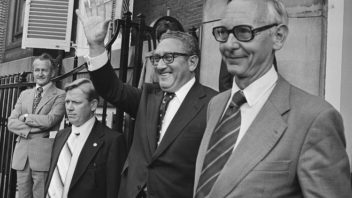KLM flies thanks to Dutch diplomacy
Foreign Affairs’ unknown role in KLM’s history
Amsterdam, 17 December 2024 – Politics comes before law in international air transport. That is why KLM could only be successful thanks to the successful international diplomacy of the Dutch government, say Marc Dierikx of the Huygens Institute and Jean Guillaume Petit in their book Holding Patterns.
In our modern world, air connections are ubiquitous. In fact, aviation is so crucial that it has played an important role in international relations between states in over a century: in conflicts, cancelling landing rights is one of the first sanctions. In the week after the Russian invasion of Ukraine, closing airspace was the first punitive measure instituted by European Union countries.
However, we know very little about aviation politics, let alone its prominent role in Dutch foreign relations. The book Holding Patterns: Air Transport and Foreign Policy in the Netherlands (Leiden/Boston: Brill, 2024) by Marc Dierikx of the Huygens Institute and Jean Guillaume Petit changes this. It is the first book to focus on the diplomatic efforts that precede flying.
Notable successes
The text covers roughly the period 1920-2022 and, in its ramifications across six continents, offers a picture of this important development in foreign trade contacts for the Netherlands. Although the basic legal principles for international aviation were already laid down in the Chicago Convention in 1944, in practice, the possibilities for growth of commercial aviation depended on international-political factors, expressed in bilateral agreements on landing rights. These were negotiated at the very highest level, often took years and branched out into many areas of foreign policy.
As a small country and being the party requesting for transport rights, the Netherlands often had a weak bargaining position. Nevertheless, remarkable successes were achieved. To strengthen the Netherlands’ international position in this regard, a consultative body was formed in 1945, on the initiative of KLM director Albert Plesman, in which the government and KLM coordinated the policy to be pursued. Collaboration was important because – as the Nestor of Dutch aviation law, Prof Daniël Goedhuis, noted in 1953 in the text for his valedictory lecture at Leiden University: ‘International aviation relations take place in an atmosphere of conflicting interests and conflicting aspirations, above which no law rises.’
Foreign Affairs crucial for KLM
This book looks at the important role the Dutch government played internationally in the development of KLM – and the diplomacy that underpinned it. It pays ample attention to the ever-changing international political, economic and legal context in which air transport operated. Foreign Affairs’ efforts were crucial to the global expansion of the KLM network. The book makes clear that KLM’s development was not merely the result of entrepreneurial spirit, but was and is to a considerable extent determined at the negotiating table of diplomacy.




